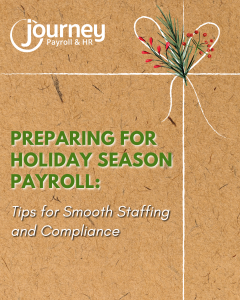The holidays will be here before you know it. The season brings more than just festive cheer; it also brings unique challenges for business owners and HR teams. Between seasonal hires, time-off requests, overtime, and year-end reporting, even small oversights can lead to payroll errors that affect both morale and compliance.
 With the right planning and proactive steps, you can make this season run smoothly, for you and your team.
With the right planning and proactive steps, you can make this season run smoothly, for you and your team.
Here are practical payroll tips to keep your holiday operations accurate, timely, and stress-free.
Plan for Seasonal Staffing Early
Many businesses rely on temporary employees during the holidays. Whether you’re hiring for retail, hospitality, or year-end administrative support, early planning is key.
- Ensure all new hires complete the correct tax and employment forms (such as Form W-4 and I-9).
- Classify workers correctly whether they’re full-time, part-time, or contractors to stay compliant with state and federal laws.
- Clearly define pay rates, overtime eligibility, and payroll schedules during onboarding.
Proactive planning prevents last-minute confusion and ensures every employee is paid accurately from day one. It’s also smart to align your hiring timeline with payroll cutoffs to avoid retroactive adjustments.
Review Overtime Rules and Schedules
The holiday rush often means longer hours and extra shifts. Make sure your payroll system and policies align with current labor laws.
- Review the Fair Labor Standards Act (FLSA) overtime rules, nonexempt employees must receive 1.5x their regular pay rate for hours worked over 40 in a workweek.
- Check state and local overtime laws, since some require overtime pay after a certain number of hours per day.
- Communicate expectations clearly to managers so they can properly track time for all team members.
Proper scheduling not only helps you stay compliant, it also ensures your employees feel valued and fairly compensated during one of the busiest times of the year.
Prepare for Holiday Pay Policies
Will your team receive paid holidays or premium pay for working on them? Now is the time to review and communicate those policies.
Make sure everyone knows:
- Which holidays are recognized and whether the business is open or closed
- Who is eligible for holiday pay
- How holiday shifts impact overtime and scheduling
If you make any policy updates, distribute them in writing and get acknowledgment from your employees. Transparency prevents misunderstandings later and keeps everyone on the same page.
Double-Check Time-Off Requests
As employees make holiday travel and family plans, time-off requests can pile up quickly. A structured approval process helps you stay organized and fair.
- Set a clear deadline for submitting holiday time-off requests.
- Use a shared scheduling tool or calendar to manage availability.
- Ensure adequate coverage to prevent service disruptions.
Approving time off fairly and consistently reduces stress, prevents burnout, and keeps your business running smoothly throughout the season.
Keep Year-End Reporting in Mind
The end of the year isn’t just about holiday bonuses and celebrations it’s also the start of year-end payroll prep.
- Audit your year-to-date payroll reports to catch any discrepancies early.
- Verify that employee data (addresses, Social Security numbers, etc.) is up to date.
- Coordinate with your payroll provider to ensure W-2s and year-end tax forms are processed accurately and on time.
Getting a head start on year-end reporting helps you avoid errors and ensures employees receive their tax documents promptly in January.
Final Thought
The holiday season can be one of the most demanding times for business owners, but with early preparation, clear communication, and reliable payroll processes, it doesn’t have to be stressful.
At Journey Payroll & HR, we specialize in helping businesses navigate seasonal payroll and compliance challenges, so you can focus on your team and enjoy the season ahead.